
Flags of member states fly in front of the United Nations Secretariat building in New York in 2018 (United Nations photo)
The United Nations celebrates its 75th anniversary today at the U.N. General Assembly in New York during a crucial and perplexing moment.
As the world body acknowledges, "the UN is marking its 75th anniversary at a time of great disruption for the world, compounded by an unprecedented global health crisis with severe economic and social impacts."
Formed in the aftermath of World War II, the 193-member United Nations acts as an international forum where issues are debated and solutions to global challenges like poverty, gender inequality and climate change are weighed and developed. Its various humanitarian arms, such as the World Food Program, administer large-scale efforts to feed people in war- and drought-stricken countries.

U.S. Secretary of State Edward Stettinius Jr., chairman of the U.S. delegation to the United Nations Conference on International Organization, signs the United Nations Charter at a ceremony in San Francisco on June 26, 1945. President Harry S. Truman stands at the left. (U.N. photo)
Today's ceremony — held to coincide with the annual meeting of the General Assembly rather than the actual anniversary date, which is Oct. 24 — cannot encompass all of the complexities and controversies surrounding the United Nations' history.
In an assessment of the global body for the 70th anniversary in 2015, the U.K.-based newspaper The Guardian noted that Dag Hammarskjöld, the second U.N. secretary-general, said the United Nations "was created not to lead mankind to heaven but to save humanity from hell."
But even that aim has sometimes bumped up against harsh realities. As The Guardian noted, the U.N. has "been dismissed as a shameful den of dictatorships. It has infuriated with its numbing bureaucracy, its institutional cover-ups of corruption and the undemocratic politics of its security council. It goes to war in the name of peace but has been a bystander through genocide. It has spent more than half a trillion dollars in 70 years."
Members of sister congregations or representatives of sister congregations who engage in advocacy work at the U.N. tend to take a nuanced view of the global body, finding in it both strengths and weaknesses.

Hervé Ladsous, right, U.N. under-secretary-general for peacekeeping operations, arrives in Bor, South Sudan, in July 2013. (U.N. photo)
"For all its accomplishments and failures, the U.N. is still the global arena that peoples of the world and their leaders can dialogue about world issues on an equal footing: one nation, one vote," Maryknoll Sr. Marvie Misolas, representative of the Maryknoll Office for Global Concerns at the U.N., told GSR.
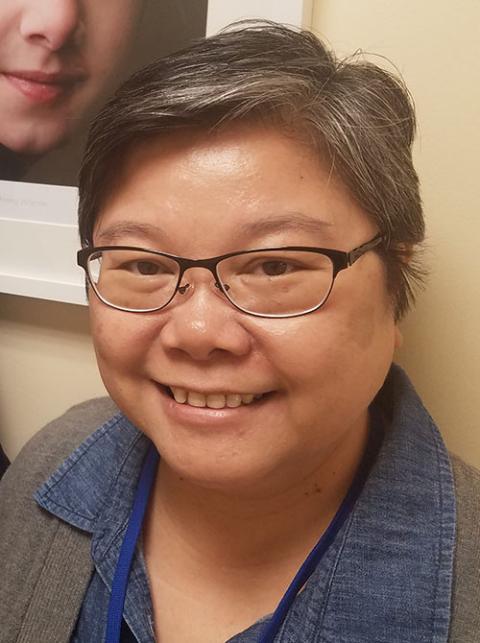
Maryknoll Sr. Marvie Misolas, representative of the Maryknoll Office for Global Concerns at the U.N. (GSR file photo)
Misolas said the U.N.'s greatest accomplishments during the past 75 years include raising the visibility of human rights as a global concern and shepherding peace, nuclear disarmament and climate change agreements, as well as developing the 2030 Agenda for Sustainable Development.
However, "the U.N. over the years has failed to sanction states that have continued to have repressive and corrupt regimes; failed to make the superpower nations "walk the talk" — in terms of environmental and economic equity in relations to human rights and respecting national boundaries," she said.
Beth Blissman, the U.N. representative for the Loretto Community, takes an equally expansive view: "Much in our world has changed over the past 75 years. There are more people, more countries, more challenges but also, hopefully, more solutions," she said.
Amid all of this rapid change, she asks: "Does the United Nations need to be a more responsive, nimble and accountable organization that can build trust and consensus? Yes. Does it need to deliver better in the field and adapt more quickly to global challenges? Yes, definitely. Is there any other global organization with the legitimacy, convening power and normative impact as the United Nations? No."
To mark the 75th anniversary, Global Sisters Report asked Misolas, Blissman and others representing sister congregations about the milestone anniversary, to reflect on the U.N.'s accomplishments and failures and the difficulties and challenges it faces now and in the future.

Children living in a U.N.-guarded camp near Pristina, Kosovo, which housed about 5,000 Roma civilians during the conflict in Kosovo, in 1999 (U.N. photo)
Besides Misolas and Blissman, those participating included:
- Sr. Carol De Angelo, director of the Office of Peace, Justice and Integrity of Creation for the Sisters of Charity of New York;
- Sr. Winifred Doherty, who represents the Congregation of Our Lady of Charity of the Good Shepherd at the U.N.;
- Sr. Teresa Kotturan, who represents the Sisters of Charity Federation at the United Nations;
- Sr. Helen Saldanha, a member of the Missionary Sisters Servants of the Holy Spirit and an executive co-director of VIVAT International, a global human rights advocacy organization that works at the United Nations.
Their responses, received by email, have been edited and condensed.
GSR: What has been the United Nations' greatest accomplishment, and what has been its greatest failure?
Blissman: In my view, there have been at least four great accomplishments:
- Pulling together the creation of a multifaceted, multilingual global organization preventing the "scourge of war," as stated in the U.N. Charter;
- Serving as a place for countries to come together to solve global challenges, with one vote per country;
- Providing global leadership on problems that are too large for single countries or regions to tackle, such as the climate crisis;
- Supporting small steps, or even a pathway, to life beyond male patriarchy through the empowerment of women and girls coupled with efforts of the current secretary-general to bring gender parity at the highest levels of the U.N.
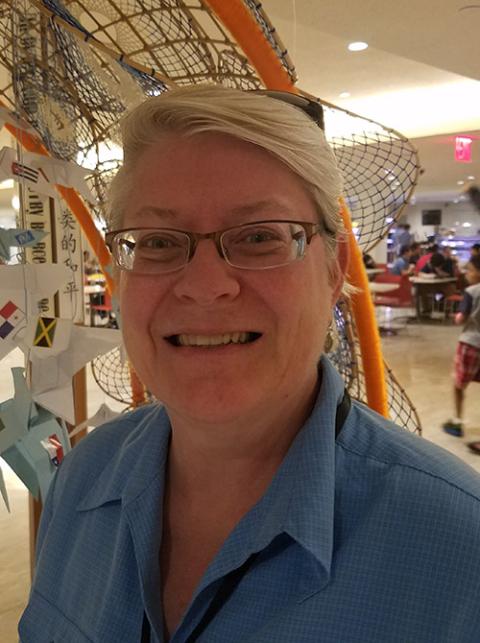
Beth Blissman, the U.N. representative for the Loretto Community, in 2017 (GSR file photo)
I take particular hope from the 2017 passage of the treaty for the prohibition of nuclear weapons. I remember the feeling in that conference room: It was electric. I don't know if I've ever experienced so much hope in one day in my entire life and so much gratitude that humans are indeed capable of doing the right thing, even if it is politically unpopular with those wielding power.
The climate crisis is a perfect example of a challenge that takes global collaboration, and since 1972, the United Nations has convened conferences to address environmental and climate concerns. As a global body, the United Nations has affirmed the need for women's equality; the 1995 Beijing Declaration and Platform for Action, adopted unanimously by 189 countries, still stands as the most progressive global policy document for gender equality.
Still, even though there have been world conferences and policy documents created [on the status of women and girls], for much of the U.N.'s 75-year history, it has been mostly male-led and has not challenged engrained patriarchal values in nation-states and their governments. The integration of voices of women and girls and those not on the gender binary on par with male voices are needed to tackle our current global challenges of nuclear threat, climate collapse and the COVID-19 pandemic.
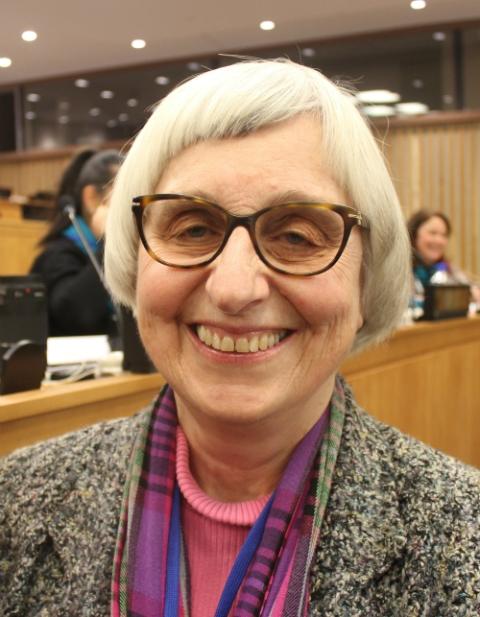
Sr. Carol De Angelo, director of the Office of Peace, Justice and Integrity of Creation for the Sisters of Charity of New York (GSR file photo)
De Angelo: A major achievement are the sustainable development goals, with their emphasis on three areas: economic, social and environmental. I call the goals "global beatitudes" because they flesh out the call of Pope Francis' "Laudato Si', on Care for Our Common Home." The U.N. is a place where we can listen to the cries of the Earth and her peoples and respond in hope.
Through its commissions, forums and meetings, the U.N. raises up the voices and stories of Indigenous peoples, migrants, the Earth and her communities of life. I believe its work, even with its incompleteness and frustrations, leads us to an ever-growing individual and collective consciousness as we grow in understanding and acting as brothers and sisters to each other — human and nonhuman. I see change happening, even transformation.
On shortcomings, I think it is the inability of the U.N. member states to work together to address two of the greatest global issues: climate crisis and migration. Yet as I say this, I think of the meetings with nongovernmental organizations [NGOs], U.N. ambassadors and staff of member states who have worked tirelessly on efforts to address climate change and migration, and in the past two years, the successful effort to include homelessness as the theme for the 2020 Commission for Social Development.
The phrase "think globally, act locally" is quite relevant at the U.N., and it is critical that people affected by the issues have a voice. I think the U.N. has raised up the voices of those who are affected by climate crisis and migration. So, that is a success.
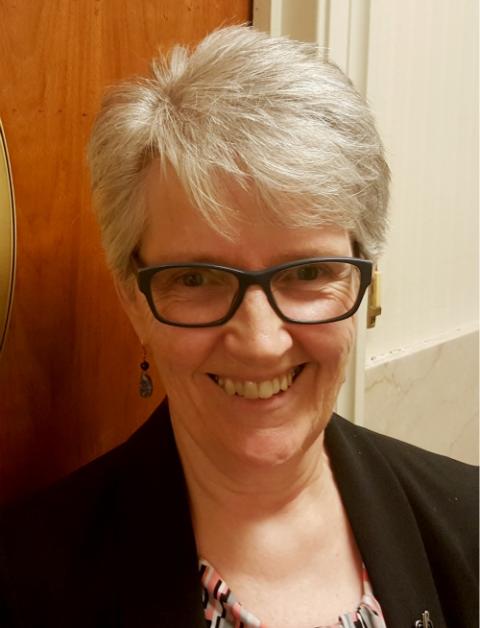
Sr. Winifred Doherty, the U.N. representative of the Congregation of Our Lady of Charity of the Good Shepherd (GSR file photo)
Doherty: In my decade-plus as NGO representative at the United Nations, I have participated in some very noteworthy achievements: the establishment of UN Women in 2010, the 2030 Agenda for Sustainable Development in 2015, the New York Declaration for Refugees and Migrants in 2016 and the global compact for migrants in 2018.
All the aspirations, visions and recommendations related to ending poverty, promoting gender equality and dealing with the climate crisis were realized in an integrated way in the sustainable development goals, which weaved three pillars of social, environmental, and economic concerns into a 15-year plan.
But it is against this backdrop of achievements that I think the greatest failure occurred: failure to mobilize the necessary resources to implement the vision promoting the well-being of people and planet. A stumbling block that prevents member states from forging consensus and implementing commitments is when they cite national sovereignty on certain policies they disagree with. When that happens, it is a detriment to people and planet.
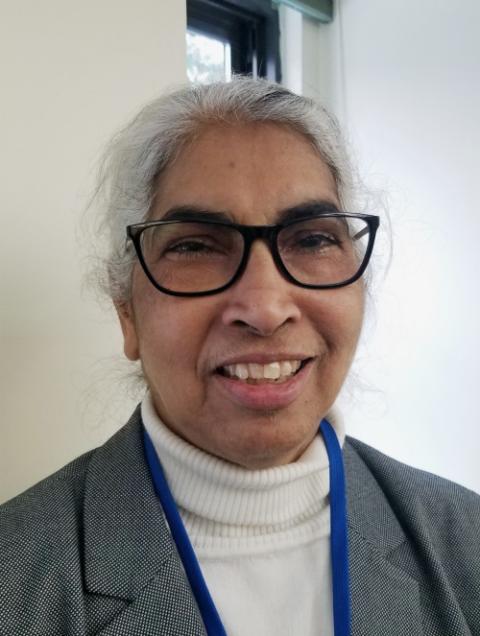
Sr. Teresa Kotturan, U.N. representative for the Sisters of Charity Federation (GSR file photo)
Kotturan: One of the greatest achievements has been helping end colonial rule in 80 countries through the Trusteeship Council. That's important because without independence and ushering in some form of democratic governance, people cannot enjoy fundamental freedoms and human rights.
The humanitarian assistance that the U.N. offers is commendable. The food programs of the United Nations help feed 90 million people, and that's a gigantic task. The continued outreach to 26 million refugees and another 54 million displaced people shows that the U.N. remains committed to caring for the most vulnerable. The vast majority of developing countries have been able to control most of the communicable diseases through the efforts of the World Health Organization and Gavi [the international vaccine alliance formed to improve access to vaccines for children].
As for failures, the U.N. has become the private club of member states. People's concerns are relegated to the sidelines, and there is no forum within the U.N. system to hear the voice of the people. The role civil society organizations play and the space they have are shrinking. Multilateralism is giving way to unilateralism, populism and transactional engagements.
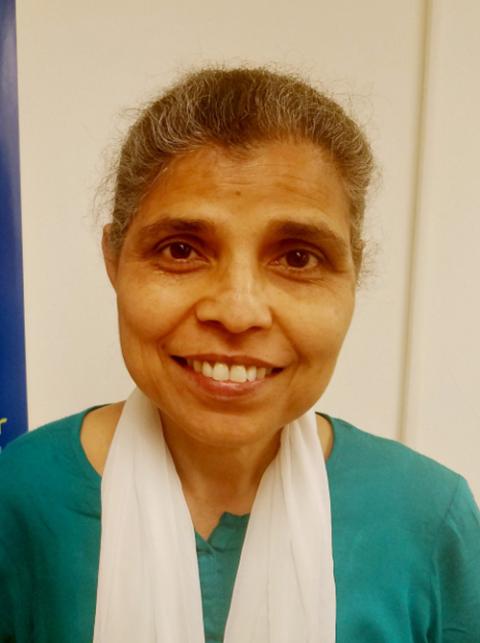
Sr. Helen Saldanha, a member of the Missionary Sisters Servants of the Holy Spirit and an executive co-director of VIVAT International, a global human rights advocacy organization that works at the United Nations, in 2018 (GSR file photo)
Saldanha: I believe the United Nations is relevant for all times. Internationally, there are discords, conflicts, power struggles and attacks on human rights. But the U.N. is the essential place for multilateralism, even if we know the U.N.'s functioning is not always ideal.
The preamble to the United Nations' charter, "We the peoples," is a powerful proclamation of people's power, and the U.N.'s Universal Declaration of Human Rights is a blueprint we can fall back to; its significance and relevance always beckons leaders, policymakers, civil society groups and, indeed, every human being. And sometimes, legislation enacted at the country levels flows from the commitments made here at the U.N.
What changes are needed for the U.N. going forward, given the challenges of the present moment?
Blissman: If I could wave a magic wand at the United Nations and be granted one structural change, I'd have to go with restructuring the Security Council. Having five permanent members with veto power makes inequity and posturing the rule of the day. The way things are currently structured favors the global north, and the countries of the global south — where extractive industries are wreaking havoc with the living systems of Earth — lack enough voice and vote to bring about justice.
Saldanha: The U.N. must be a place of inclusion, where civil society groups are a part of the process, where the statements and words are translated into global policies and national laws with full accountability toward implementation. We need a U.N. that will make our world a better place for all. There is dichotomy when the member states uphold commitments to multilateralism but refuse to accept glaringly visible human rights violations.

Brazilian peacekeepers from the United Nations Stabilization Mission in Haiti distribute water and food in Port-au-Prince, Haiti, following the January 2010 earthquake. (U.N. photo)
Nationalism is on the rise in many countries. How can the U.N. overcome that dynamic? Few would deny that the United Nations is a largely symbolic body, as it can't make governments "do" anything. Is that ever likely to change?
Doherty: The theme of Sept. 21, "The Future We Want, the U.N. We Need: Reaffirming our Collective Commitment to Multilateralism," is a very apt title with a focus on what steps need to be taken to change mindsets so as to bring about the collective commitment to multilateralism.
This is a human journey of transition, individually and collectively, from ego to eco. It is a process and a struggle. "The future we want" has been captured in the phrase of the sustainable development goals' "leave no one behind."
I have always held in my engagement with the U.N. that it is a "gospel space" — a space where issues that violate the inherent dignity and rights of the person seek justice, redress and inclusion. There is no doubt that the U.N. as a structure needs reform, but the spirit that echoed throughout the U.N., "Leave no one behind," in 2015 needs to re-echo in the hearts and minds of diplomats present at the U.N. and beyond, to confront the global networks of power and structures that uphold patriarchy, neoliberal capitalism, white privilege and elitism.
Kotturan: Any reform agenda should have a clause that says that those countries moving away from multilateralism and engaging in nationalism should have reduced participatory role in U.N. proceedings. When they sought U.N. membership, they had agreed to these principles. They cannot change the rules of the game once they get a foothold in the system.

In this 2009 photo, a resident of the Kibati camp for internally displaced people in North Kivu, Democratic Republic of the Congo, carries a food ration distributed by the World Food Program in collaboration with the Catholic nongovernmental organization Caritas. (U.N. photo)
Given the current COVID moment, can the world get back on track with the sustainable development goals? If so, how?
De Angelo: Cracks of injustice, inequity and exclusion are present. COVID-19 has widened and created more cracks, and Earth and her people are hurting. Yet the sparks of light at the U.N. can help us find our way and build toward a new recovery, perhaps even create new economic, social and environmental systems and structures that are just, inclusive and equitable.
Birthdays are times for celebration and a reminder of the promise of new life in the year ahead. Those of us involved with the United Nations, or perhaps even more so people of faith, like me, need to commit to dream and to vision together, to keep alive the hope for a new world order. We do this one action at a time, step by step, preparing a foundation with collaborative efforts that we seed with patience and perseverance and water with right relationships bonded together by respect, integrity, equality and justice.
Doherty: The COVID-19 global pandemic has made us stop. It is an opportunity to reflect, think and intuit new processes that are inclusive of all living beings and Mother Earth based on care, respect and rights. The sustainable development goals are indeed an already-prepared roadmap. We are in a decade of accelerated action. That action is possible by putting the resources at the service of the people. End militarization and share resources for a more equitable situation for all.
Kotturan: Even prior to COVID-19, the secretary-general had indicated that the world was not on track to achieve the sustainable development goals in spite of the accelerated focus on the decade of action. With the onset of the pandemic, the achievements of the past five years are being reversed. The crises our world face today — health, economic and financial — have created a domino effect. Millions have lost jobs, and they are being pushed into poverty, hunger, lack of access to health care and education, and homelessness.
We do have a window of opportunity now to reimagine our world in solidarity, to find transformative pathways, innovative solutions to address the structural injustices and work for systemic change. Recovery efforts should be equitable, resilient and sustainable. They need to harness the kernel of compassion present in people. The world does have a roadmap for recovery: Implement the 2030 agenda in its totality.
Misolas: We must not only aim to get back on track, but aim to make a shift to a just and ecological path of rebuilding. We must use the "green pathway," prioritizing the environment sustainable development goals and work from there. Our aim must be a healthy planet with healthy people. That means we must align our economic paradigms: finance, agriculture, health and education, consumption/productions.
[Chris Herlinger is GSR international correspondent. His email address is cherlinger@ncronline.org.]
Advertisement






